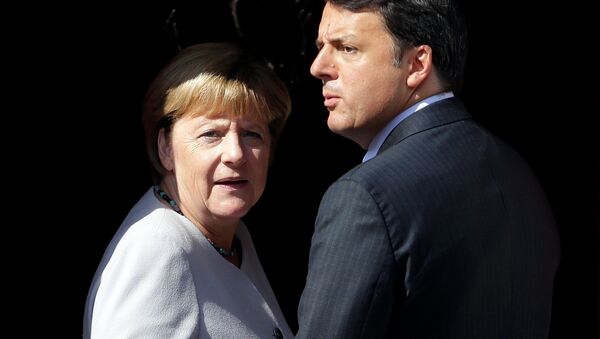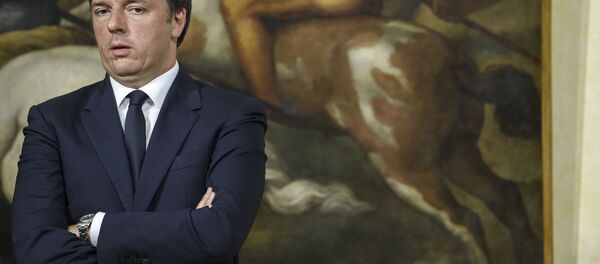As EU leaders discuss a mid-term review of the EU budget, Italy has become central to talks, with the dramatic impacts of the migration crisis over the past two years leading Prime Minister Matteo Renzi to call for more resources to be directed towards border controls and the handling of immigration issues.
… and will continue to change, which is why our mid-term review of the multiannual #EUBudget addresses these issues & others. @ONEinEU pic.twitter.com/h5fIdIav8s
— Kristalina Georgieva (@KGeorgievaEU) November 8, 2016
Talks between ministers will take place on November 16-17, with Professor Iain Begg from the London School of Economics (LSE) telling Sputnik that major changes were unlikely to occur during negotiations.
"I think it's unlikely that an agreement that changes much would be likely by the end of [Thursday, November 17] because… the budget is set in a seven-year framework and unpicking it is a monumental task. All we will see is changes in the margins," Professor Iain Begg told Sputnik.
EU to 'Mollify' Renzi
As part of these potential changes to the margins, Professor Begg says EU leaders may try to "mollify the likes of Matteo Renzi," who is pushing for greater spending on border control and migration-crisis related costs.
"It's possible that there'll be some agreement to pay for the relatively inexpensive components of the budget, such as additional support for border control, but you're not going to see big changes to things that are the most costly elements of the EU budget."
Renzi ramping attack on EU budget plan, LePens increasing support.. we might see disintegration of #EU earlier than # Brexit
— Aditya (@aditya01t) November 16, 2016
Renzi, facing a potentially career-ending referendum on constitutional reform in December, has upped the rhetoric on EU money allocation, with many commentators predicting that he needs to force the EU to make changes in order to win domestic support.

The prime minister has also threatened to veto EU budgets if member states don't assist Italy and Greece with the relocation of refugees, in a thinly veiled attack of Visegrad 4 countries Hungary, Poland, Slovakia and the Czech Republic.
Will Brussels pick a fight w/ Italian PM Renzi on 2017 budget deficit when facing strong support from opposition calling for an #EUref?
— Elliott Jon Mears (@elliottjmears) October 18, 2016
Despite the European Commission proposing to boost spending on jobs and growth, migration and security by US$13.9 billion (€13 billion) between 2017 and 2020, Italy's Europe Minister Sandro Gozi remained unhappy at the proposals.
"We think we still need a proposal which gives us many more guarantees on a real increase in resources for our nation. I am thinking of immigration, I am thinking about security, I am thinking about European resources for the young," Gozi said.
Renzi and allies doing their best to advertise Italy's (pre-)veto on multi-annual EU budget. Comes handy three weeks before referendum.
— Vincenzo Scarpetta (@LondonerVince) November 15, 2016
And while no significant shifts in the EU's allocation of spending is expected during the talks, Professor Begg said that any changes could set a precedent for further EU budgets.
"What it can do is affect the next annual budget, which will be for 2017, where there might be some scope for saying 'spend a little bit more on x and a little bit less on Y.' X could be support for refugees, support for border control and Y could be trying to reduce current spending on EU development projects which are slow to take off," Professor Begg told Sputnik.
Row Over Spending Limits
Aside from debate over how EU contributions should be spent, Italy has also bucked horns with other member states over rules governing the spending limits of individual EU countries.
Under the bloc's Stability and Growth Pact rules, member states must ensure that any deficits remain under three percent.
Brexit, Colombia, Trump — Matteo Renzi must be feeling nervous about Italy's constitutional referendum in December.
— jo gill (@JoGillJourno) November 9, 2016
However, Rome has argued that the tight fiscal measures are stifling some economies and should be loosened to allow EU members to invest more money in order to boost growth.
This stance has set Italy, Greece and other southern European countries on a collision course with Germany and other northern European member states, who have warned that increasing public spending and subsequently, public debt, is a risky proposition for a bloc still suffering the effects of the 2008 global financial crisis.



